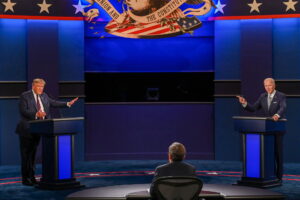by The Cowl Editor on October 15, 2020
National and Global News

by Addison Wakelin ’22
News Staff
Less than a month away from the 2020 presidential election, the first presidential debate left many Americans in a state of pessimism and uncertainty about the future of the United States.
On Tuesday, Sept. 29 in Cleveland, former Vice President Joe Biden and President Donald Trump faced off in a brutish debate during one of the most unprecedented times in modern U.S. history. The debate was moderated by Fox News anchor Chris Wallace.
Although the debate became somewhat personal given Trump’s jeers and ad hominem attacks against Biden and his family—especially Hunter Biden—the two debated on some important topics pertaining to the United States. The debate can be broken down into several important topics, picked by Wallace, including the Supreme Court vacancy, the COVID-19 pandemic, protests and violence in cities as a result of the issue of racism, and the economy.
Following the tragic death of former Supreme Court Justice Ruth Bader Ginsburg, the Supreme Court vacancy has become a point of interest for Republicans. Less than two weeks after RBG’s death, Trump announced he would nominate Amy Coney Barrett to the Supreme Court.
Several Republicans, including South Carolina Senator Lindsey Graham and Kentucky Senator Mitch McConnell, have been criticized for their hypocritical comments on blocking Obama’s nomination of Merrick Garland to the Supreme Court in 2016, claiming it would be unfair to Americans to vote for a justice during an election year.
Biden countered Trump’s claims, warning that Barrett’s potentially successful nomination will solidify a 6-3 conservative majority in the Supreme Court. As a result, Republicans will be able to repeal Roe v. Wade and the Affordable Care Act, unraveling years of progressive lawmaking that could strip away healthcare accessibility and benefits for many Americans, especially women.
COVID-19 also became a major point of discussion during the debate. Trump has been criticized for holding several rallies without masks or social distancing enforcement, as the U.S. has surpassed 215 thousand coronavirus deaths. Trump taunted Biden during the debate for his mask-wearing, saying, “I don’t wear a mask like him. Every time you see him, he’s got a mask. He could be speaking 200 feet away from you and he shows up with the biggest mask I’ve ever seen.”
Less than 72 hours after the debate, on Oct. 2, Trump announced he tested positive for COVID-19. He tweeted: “Tonight, @FLOTUS and I tested positive for COVID-19.” Trump was promptly hospitalized at Walter Reed Hospital and treated with an experimental antibody treatment, steroids, and oxygen. He has since been released.
Perhaps the most shocking part of the debate was Trump’s failure to condemn white supremacists. Wallace challenged Trump, asking if he is willing to “condemn white supremacists and militia groups.” Both Wallace and Biden pushed Trump to condemn white supremacists. After asking for a specific group to condemn, Biden suggested the Proud Boys, a far-right, fascist organization that spouts anti-Semitic, Islamophobic and other bigoted rhetoric.
Trump stated, “Proud Boys, stand back and stand by.” Trump’s comments caused an uproar. “Stand back and stand by” suggests that these groups wait for his command and is not a condemnation of their actions.
The debate left one question: who won? For many Americans, the answer is no one. The nation is at a standstill between polarizing political beliefs and a chaotic year defined by a pandemic and socio-racial upheaval.
Many viewers felt as though the true loser of the debate was the United States itself. Between the U.S. nearing almost 220 thousand coronavirus deaths, millions of Americans having filed for unemployment and facing eviction since the pandemic started, and growing social unrest, the U.S. faces a desolate political landscape.
Only time will tell if the U.S. can muster the strength and unity necessary to overcome the hardships that have plagued this country.
After Trump’s COVID-19 diagnosis, the Commission on Presidential Debates decided that the second presidential debate, initially scheduled for Oct. 15, would be canceled, citing Trump’s refusal to participate in a virtual debate.
Both candidates have instead opted to host their own respective virtual town halls on Oct. 15 at 8 p.m., with NBC covering Trump’s town hall and ABC covering Biden.
The next debate is scheduled for Thursday, Oct. 22 in Nashville, moderated by NBC’s White House correspondent Kristen Welker.